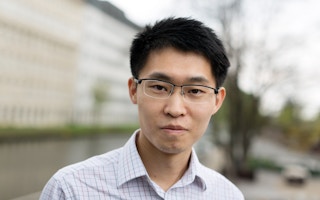American think tank Asia Society Policy Institute (ASPI) has set up a new China Climate Hub and hired former Greenpeace campaigner Li Shuo to head the team.
The hub aims to facilitate engagement and mutual understanding on climate between the United States and China, the world’s two largest greenhouse gas emitters.
It also seeks to provide analysis to help the international community understand how China formulates its policies and positions on climate, Li told Eco-Business.
Untuk melanjutkan membaca, cukup daftar – gratis!
- Dapatkan berita terbaru, pekerjaan, acara, dan lainnya dengan Buletin Mingguan kami yang dikirimkan kepada Anda secara gratis.
- Akses gudang berita dan pandangan terbesar tentang topik keberlanjutan.
- Anda juga dapat mempublikasikan pekerjaan, acara, siaran pers, dan laporan penelitian Anda di sini!
Pelanggan buletin tidak harus memiliki akun situs web. Silakan mendaftar secara gratis untuk melanjutkan membaca!
Li, who was global policy adviser for Greenpeace East Asia, leaves the environmental campaign group after 12 years and will move from Beijing to Washington D.C. in January next year.
This month, China and the US agreed to resume stalled cooperation on the climate crisis. Li said that his team is finding its footing at a very interesting time, when the two countries are realigning on the climate agenda.
“Moving forward, we will try to inject as much resilience as possible into China’s international climate engagement with other major countries, particularly the United States.”
Just hours ahead of a high-stakes leadership summit between Chinese president Xi Jinping and US president Joe Biden on the sidelines of the Asia Pacific Economic Cooperation (APAC) meeting at San Francisco on 15 November, an accord was struck by the nations’ climate envoys Xie Zhenhua and John Kerry at a meeting in the Sunnylands resort in California, a symbolic site of US-China cooperation.
Both sides pledged to renew climate cooperation and relaunch a working group to step up joint action to combat global warming, including to “pursue efforts to triple renewable energy capacity globally by 2030”.
Li highlighted how think tanks like the Asia Society had played a role in hosting and facilitating key meetings when Xi was in the US. He believes the new climate hub that operates under the think tank, which traditionally has been focused not only on climate but international affairs, will have a unique advantage in gaining access to views from both nations.
According to Chinese government sources, China’s veteran climate envoy Xie Zhenhua will be stepping down next month and the upcoming COP28 climate summit will be his swan song. Similarly, Li said there is speculation that US climate envoy John Kerry is likely to leave his role too.
The two countries will soon be expecting a new batch of climate leaders. We will need to prepare for that,” said Li, who will be attending the COP meeting in his new role.
As an advisor for Greenpeace East Asia, Li had been a frequent commentator on China-related climate and energy issues. He started his career with Greenpeace as a policy officer in 2011.





















